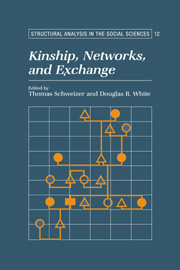Book contents
- Frontmatter
- Contents
- Preface
- List of contributors
- 1 Revitalizing the Study of Kinship and Exchange with Network Approaches
- I Representing Kinship Dynamics, Material Flow, and Economic Cooperation
- II Individual Embeddedness and the Larger Structure of Kinship and Exchange Networks
- III Marriage, Exchange, and Alliance: Reconsidering Bridewealth and Dowry
- IV Emergence, Development, and Transformation of Kin-Based Exchange Systems
- 12 Applications of the Minimum Spanning Tree Problem to Network Analysis
- 13 Local Rules and Global Structures: Models of Exclusive Straight Sister-Exchange
- 14 The Capacity and Constraints of Kinship in the Development of the Enga Tee Ceremonial Exchange Network (Papua New Guinea Highlands)
- 15 Between War and Peace: Gift Exchange and Commodity Barter in the Central and Fringe Highlands of Papua New Guinea
- Index
14 - The Capacity and Constraints of Kinship in the Development of the Enga Tee Ceremonial Exchange Network (Papua New Guinea Highlands)
Published online by Cambridge University Press: 05 November 2011
- Frontmatter
- Contents
- Preface
- List of contributors
- 1 Revitalizing the Study of Kinship and Exchange with Network Approaches
- I Representing Kinship Dynamics, Material Flow, and Economic Cooperation
- II Individual Embeddedness and the Larger Structure of Kinship and Exchange Networks
- III Marriage, Exchange, and Alliance: Reconsidering Bridewealth and Dowry
- IV Emergence, Development, and Transformation of Kin-Based Exchange Systems
- 12 Applications of the Minimum Spanning Tree Problem to Network Analysis
- 13 Local Rules and Global Structures: Models of Exclusive Straight Sister-Exchange
- 14 The Capacity and Constraints of Kinship in the Development of the Enga Tee Ceremonial Exchange Network (Papua New Guinea Highlands)
- 15 Between War and Peace: Gift Exchange and Commodity Barter in the Central and Fringe Highlands of Papua New Guinea
- Index
Summary
INTRODUCTION
We will begin with what will be the endpoint of some of the chapters in this volume: the fact that in pre-state societies kinship structures reciprocity, and reciprocity in turn determines to a significant extent who is regarded as kin. Without kinship, reciprocity is hard to realize, without reciprocity, a sense of kinship fades. That kinship structures reciprocity is not only well-substantiated in the anthropological literature but is also the framework taken by people from many cultures in explaining their own systems of exchange. For example, though worlds apart, both the !Kung San of the Kalahari and the Enga of Highland New Guinea will specify the obligations that one has to close biological kin, including both the benefits and the hassles, for it is close family members who often take the most liberty concerning reciprocation. They will go on to explain that marriage, which produces “instant kinship” without the years of familiarity that usually back such bonds, brings obligations, the most formal and pressing ones. Finally, they will make it clear that because one does not know what is in the hearts and minds of distant or non-kin, the delayed, unbalanced exchange that characterizes giving between close kin gives way to barter with kinship distance. In both societies, the obligations of kinship bring some of the greatest stresses of life and, when successfully executed, the greatest joys and satisfactions.
- Type
- Chapter
- Information
- Kinship, Networks, and Exchange , pp. 277 - 302Publisher: Cambridge University PressPrint publication year: 1998
- 3
- Cited by



